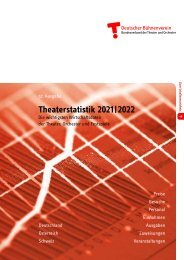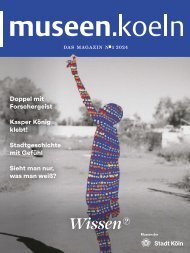Malteser International Annual Report_E
- No tags were found...
Create successful ePaper yourself
Turn your PDF publications into a flip-book with our unique Google optimized e-Paper software.
conflict regions of the Middle East. In the vast majority<br />
of cases, it is the result of a complex interplay between<br />
political, social, economic and ecological factors. Millions<br />
of people are on the run from persecution because<br />
of their religion, ethnic background, political or sexual<br />
orientation, while others have been displaced by catastrophic<br />
drought and flooding. Addressing the causes of<br />
forced displacement requires action against these factors.<br />
This can only be achieved through a sound political<br />
framework and strong human rights policies, with humanitarian<br />
actors serving as catalysts at best. Their core<br />
mandate remains the alleviation of human suffering and<br />
the negative impacts of displacement.<br />
As local as possible ...<br />
Developing nations host over 80 per cent of the world’s<br />
refugees and almost all internally displaced persons live<br />
in the poorest countries. There is no denying the link<br />
between poverty and displacement. While national<br />
governments shouldn’t have to bear the sole responsibility<br />
of providing long-term prospects for people on<br />
the run, they have a special role to play. Isolated aid<br />
intervention alone will not have the desired impact.<br />
The only way to bring about these prospects will be to<br />
combine national action and international support with<br />
an economic, social, environmental and security policy<br />
that has been tested in development policy terms.<br />
It is also the case that key responders to displacement<br />
include a wide range of actors from the Global<br />
South, including local faith communities, civil society<br />
organizations, regional and national institutions. In<br />
recent years – and especially since the 2016 World Humanitarian<br />
Summit in Istanbul – the ‘localization of aid’<br />
has become prominent in discussions about responses<br />
to current humanitarian challenges. Working with and<br />
strengthening local capacities has risen high on <strong>Malteser</strong><br />
<strong>International</strong>’s agenda and a core part of its strategy.<br />
In most of our project countries, it is the local partner<br />
organizations that make our assistance possible and<br />
translate it into concrete action. These actors are often<br />
the first responders when crises hit; they are best placed<br />
to provide timely, cost-effective and appropriate humanitarian<br />
assistance. They also remain on the ground<br />
before, during and after the crisis.<br />
Despite this much articulated fact, grassroots<br />
organizations are far from being accorded the status,<br />
freedom of choice, or funding to which they should be<br />
entitled. There remains a huge divide along the lines<br />
of power and finances. At times, local actors reach<br />
the limits of their capacity and are incapable of acting<br />
neutrally in conflict situations, there is nonetheless no<br />
getting around localization, i.e. fostering self-determination<br />
and autonomy. By ensuring that solutions<br />
to problems are proffered by the people closest to<br />
the issues on the ground, and only intervening when<br />
absolutely necessary, we stay true to our commitment<br />
to subsidiarity.<br />
For us, subsidiarity is not just a humanitarian concept<br />
but at its core a proven principle of modern society,<br />
a technical and moral project reaching far beyond a<br />
strategy on localization. We will continue to advocate<br />
more self-determination and autonomy for people on<br />
the ground. The future will see us transfer processes to<br />
our project locations and ensure that those who benefit<br />
from our work not only have a say, but also make<br />
decisions.<br />
... As international as necessary<br />
Sometimes crises or natural disasters can be so huge<br />
that even countries with good response plans and crisis<br />
intervention mechanisms are unable to cope on their<br />
own. In these cases, efforts from international experts<br />
to assist local emergency forces can help ease human<br />
suffering. We are constantly expanding our emergency<br />
response capabilities and developing centralized and<br />
regional frameworks, contributing to preparedness<br />
efforts of national actors. In cooperation with the<br />
German Federal Foreign Office, we have launched the<br />
first cross-border program in Africa to make emergency<br />
aid in particularly vulnerable regions more efficient in<br />
the long term.<br />
Our partnership with<br />
grassroots medical<br />
organizations in Iraq<br />
is an example of<br />
our commitment to<br />
localization. More<br />
on the project:<br />
mint.ngo/Iraqpartners<br />
PHOTO: EMILY KINSKEY<br />
21


















